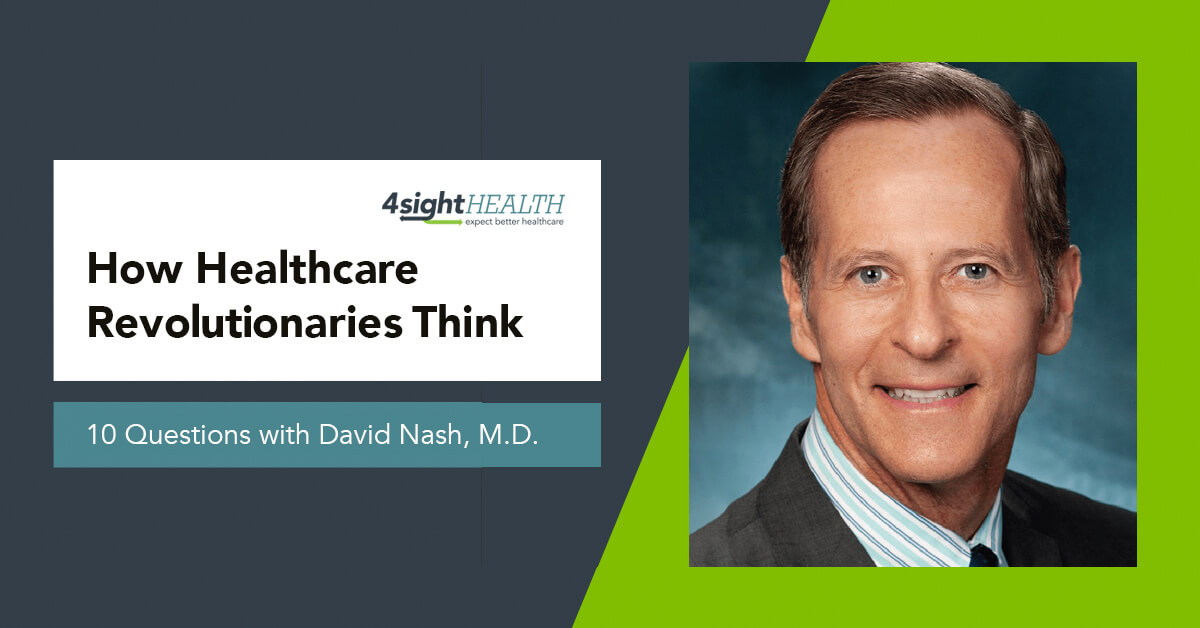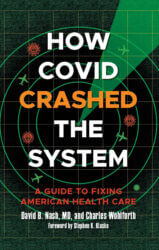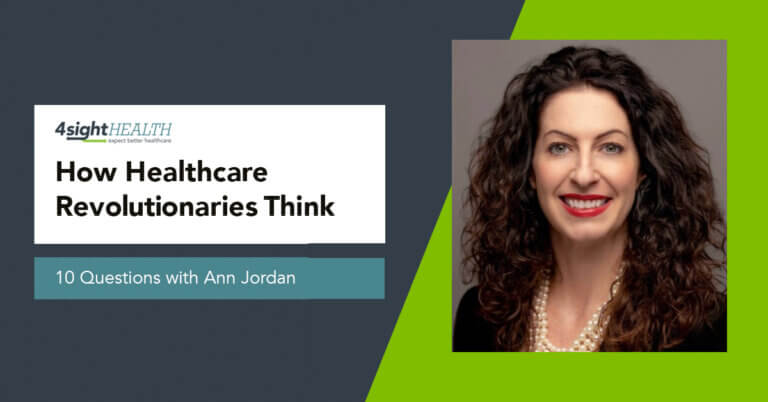July 19, 2022

How Healthcare Revolutionaries Think: 10Qs with David Nash, M.D.
Welcome to the latest installment of 4sight Health’s series, How Healthcare Revolutionaries Think. Our interview series profiles healthcare instigators who believe that outcomes matter, customers count and value rules.
Most of us healthcare watchers consider David Nash, M.D., to be the “father” of population health. Dr. Nash is the founding dean emeritus and Dr. Raymond C. & Doris N. Grandon Professor of Health Policy in the Jefferson College of Population Health at Thomas Jefferson University in Philadelphia.
Dr. Nash had a front-row seat to the COVID-19 pandemic not only as the father of population health but as the father of a physician daughter who served as a frontline caregiver to the pandemic’s first patients when PPE was short, and our knowledge of the virus was even shorter. Thankfully, both Dr. Nash and his daughter survived the experience.
Dr. Nash captured that experience in a new book, “How COVID Crashed the System: A Guide To Fixing American Health Care,” which comes out in September.
I talked to Dr. Nash about what he thinks of today’s healthcare system, today’s medical students and if either is ready for tomorrow’s population health challenges.
1. If we looked up “healthcare revolutionary” in your dictionary, what would the entry say, Dr. Nash?
Nash: To me, a revolutionary is someone who has a Trojan horse approach to change. They get inside the system and create change from the inside out. They do it through a combination of stealth, outliving their enemies and tackling the status quo head on. I’ve been lucky enough, I think, to be able to do all three in my 32 years on the faculty at Jefferson in Philadelphia.
2. Do insiders have an advantage over outsiders in trying to change the status quo in healthcare? If so, why?
Nash: Yes. There is that old saying that you can’t be a soothsayer in your own village. But I’ve always thought that insiders do, in fact, have an advantage. Why is that? Well, we know the secret handshake. We know the implicit and explicit culture. We know what color tie we’re supposed to wear. We know who sits at what part of the table. All those things are important because culture eats strategy before breakfast. I’ve always thought insiders have the advantage, especially in healthcare, where it’s been proven time and time again, even in this last decade.
3. Whose picture runs with your definition of a healthcare revolutionary in your dictionary?
Nash: There would be a few. Brent James, M.D., Gail Warden, Stephen Klasko, M.D., and Samuel P. Martin, III, M.D. That’s a pretty good list, and a list of some of the people who have had a great influence on me.
4. What’s the common thread that connects your list of healthcare revolutionaries? If they all were in a room, what would they be talking about?
Nash: Well, first of all, the Heisenberg uncertainty principle would make it impossible to have them all in the same room at the same time. If that happened, the world would tilt on its axis, and we’d be in a new ice age. So that can’t happen.
I think the thread that connects them all for me is that in their own time, they saw the future. They lived in the future in the present and made the future come alive. Let me give you a couple of examples. In 1973, Sam was talking about the need for physician leaders who graduated from medical school but also had another degree or credential after their M.D. When I met Gail, in 1990, he said he needed only three words to describe everything that’s wrong with healthcare: unexplained clinical variation. Here we are 30, 40, 50 years later talking about the same things and trying to fix the same things.
They could see around the corner and tell people clearly what’s around the corner and that they better prepare for what’s ahead. They also have to convince people, that their vision is real.
5. Given your definition and your examples, do you think you’re a healthcare revolutionary?
Nash: My physician wife of 42 years thinks I’m Don Quixote and that I’ve spent my life struggling against immovable healthcare windmills. Here lies David Nash. He really tried hard. But seriously, what matters most to me is the impact that I believe I’ve had on medical students of all sizes and shapes. It’s all about the people whom I’ve had the privilege of teaching. I hope that will be my legacy. My enduring legacy. I hope that’s what people will remember about me. My teaching and my enthusiasm for teaching.
6. What do you think your past, present and future medical students will remember about you? What lessons will they remember, or you hope they remember when they become doctors?
 Nash: They’re definitely going to remember my train whistle. I’ve blown that old train whistle to get their attention probably several hundred times in hospitals and at meeting around the country. That would be hard to forget. Seriously, I hope they remember my three main messages, which have been eerily consistent. One, if you’re not part of the solution, you’re automatically part of the problem. Two, the job of current leaders is to train tomorrow’s leaders. Three, if you change the economic incentives, you change the clinical textbook of how we practice. Like I mentioned, the good news is that I’ve been consistent with those messages for more than three decades. The bad news is we’re still talking about them, and there’s no end in sight for any of them. We’re still working to perfect all three.
Nash: They’re definitely going to remember my train whistle. I’ve blown that old train whistle to get their attention probably several hundred times in hospitals and at meeting around the country. That would be hard to forget. Seriously, I hope they remember my three main messages, which have been eerily consistent. One, if you’re not part of the solution, you’re automatically part of the problem. Two, the job of current leaders is to train tomorrow’s leaders. Three, if you change the economic incentives, you change the clinical textbook of how we practice. Like I mentioned, the good news is that I’ve been consistent with those messages for more than three decades. The bad news is we’re still talking about them, and there’s no end in sight for any of them. We’re still working to perfect all three.
7. When you connect economic incentives with how doctors practice, is that shocking to your medical students? Do they say, “Oh my God! I would never let money influence how I treat may patients.”
Nash: I think clinical audiences, like medical students, they may smirk. They may roll their eyes. But they get it. So much evidence has accumulated over the years showing money affects practice patterns that they know it and can’t deny it. When I say that to nonclinical audiences? They’re still shocked. They say, “I thought you all read the same book? I thought you all studied the same thing and practiced the same way?” Many bright people outside of the healthcare industry think we’re all doing a pretty good job and that there’s not much difference between your hospital and mine. It’s incredible to me that people still think that way, but they do.
8. What about your other messages? How are they received? Have they sunk in?
Nash: I’m still amazed that most doctors don’t see themselves are part of the solution. It’s woe is me. This is happening to me. Look at what they’re doing to me. Aside from a modest minority, they all feel victimized. Without participating in the fix, they’re just as guilty. That part is still pretty vexing to me.
On the other hand, technology has made the problem of unexplained clinical variations much clearer, and you can see how economic incentives can affect how a physician practices. Everything a physician does is recorded electronically. We know exactly what Dr. Nash ordered, when he ordered it and how what he did compares with his peers. You don’t need a hammer to hit people over the head anymore. Now you show them the data in a non-punitive closed feedback loop and give them the training they need to improve. Doctors will stampede to improve if you do both those things — data and the training.
9. In your new book, you and your co-author Charles Wohlforth search for the root causes of why the healthcare system was so unprepared for the COVID-19 pandemic. What were some root causes and how would you rank them in terms of contributing to our lack of preparedness?
 Nash: The first half of the book is all about what went wrong. The second half is about how we fix it. So, what went wrong? From a systems perspective, the answer is everything all at once. It would be hard to rank them. Every system is perfectly designed to achieve exactly the results it gets. Ditto for healthcare. There was no primary care infrastructure. There was no focus on population health. There was no focus on severity of illness or tiering who’s sick or who needs to be seen. We rushed to get telemedicine and digital health platforms up. They worked if you had an internet connection or a cell phone. If you were poor and couldn’t afford those, you were screwed. We were completely unprepared, and the thesis of the book is that we’re still unprepared. We have deep structural problems that need our attention, and we better get to it before the next pathogen comes along.
Nash: The first half of the book is all about what went wrong. The second half is about how we fix it. So, what went wrong? From a systems perspective, the answer is everything all at once. It would be hard to rank them. Every system is perfectly designed to achieve exactly the results it gets. Ditto for healthcare. There was no primary care infrastructure. There was no focus on population health. There was no focus on severity of illness or tiering who’s sick or who needs to be seen. We rushed to get telemedicine and digital health platforms up. They worked if you had an internet connection or a cell phone. If you were poor and couldn’t afford those, you were screwed. We were completely unprepared, and the thesis of the book is that we’re still unprepared. We have deep structural problems that need our attention, and we better get to it before the next pathogen comes along.
10. Last question Dr. Nash. You’ve been doing population health for more than 30 years. You’ve made it through the COVID-19 pandemic. How did you react when you first heard the word “monkeypox” in the news? Did you shrug your shoulders, or did you spit out your coffee?
Nash: I fell off my chair when I first heard it on the news. We had a case in Philadelphia in early June. At the same time, it’s totally expected. We’re going to see other diseases, other viruses as we encroach on the global habitats of all kinds of creatures, big and small, and experience other environmental changes like climate change. We can’t imagine what’s coming around the corner, but it’s coming. That’s why it’s critical that we learn the lessons from the pandemic and start putting the right systems in place now.
Burda’s Final Bit
I’ve known Dr. Nash for years. I’ve heard him speak many times and interviewed him for stories that I’ve written. Dr. Nash is, as us journalists like to say, a “big boy.” He tells it like it is. He’s not flustered by any tough questions. He’s candid. He’s direct. If he wants something, he’ll ask for it. If you say no, he’s cool. He doesn’t sweat the small stuff. He’s been preaching population health before they called it population health, and he’s still as passionate about the topic as he was more than 30 years ago. Dr. Nash knows he’s right. We know he’s right. But if we want to rebuild the healthcare system to better serve patients by keeping them as healthy possible, we really should start doing what he says.
Read More Interviews with Healthcare Revolutionaries
- June 2022: Esther Dyson
- April 2022: Meghan Conroy
- March 2022: Adrianne Nickerson
- February 2022: David Snow
- January 2022: Kristen Valdes
- October 2021: Glen Tullman
- September 2021: David Greenberg and Dave Jacobs
- August 2021: Jeff Jones
- July 2021: Scott Powder
- June 2021: Robert Pearl, M.D.
- May 2021: Kurt Waltenbaugh
- April 2021: Jon Pearce
- March 2021: Thompson Aderinkomi
- February 2021: Gaurov Dayal, M.D.





